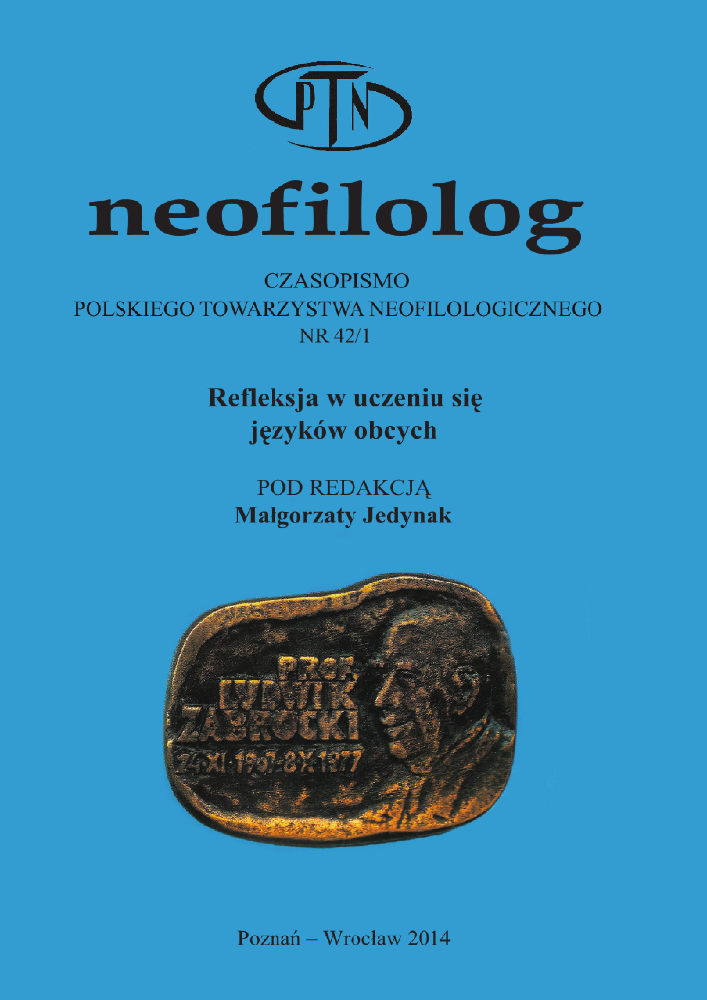Abstrakt
This paper aims to report attitudes of extramural students of the Department of English Studies, University of Wrocław, towards reflection which was introduced into a course of phonetics and into individual practice of pronunciation at home. The article opens with a brief presentation of the concept of reflection, a discussion of its importance in teaching foreign languages (FLs) and an overview of studies on the use of reflection in FL pronunciation teaching. The research design and the techniques used to develop reflection in the students in this study are then described. From the perspective of many learners involved in this research introducing reflection into pronunciation learning had several positive effects: it helped learners set goals and made them aware of effective learning strategies. It also aided them in self-evaluation, in understanding the emotions accompanying the learning of FL pronunciation, and in finding ways of dealing with these. However, it was found that many students were reluctant to have reflection introduced into the learning process. This was mainly due to lack of time and to students’ belief that reflection does not bring any positive results. Finally, the author suggests that the ability to reflect on one’s learning is difficult and dependent on individual predisposition, and that it requires special training.
Bibliografia
Baran-Łucarz, M. 2013a. „Phonetics learning anxiety - results of a preliminary study”. Research in Language 11.1: 57-79. DOI: https://doi.org/10.2478/v10015-012-0005-9.
Baran-Łucarz, M. 2013b. „Anxiety in a FL pronunciation course” (w:) Proceedings of PTLC2013, Papers from the Phonetics Teaching and Learning Conference, London, 8-10 2013 (red. J. Przedlacka, J. Maidment i M. Ashby). London: Chandler House: 19-22.
Bukowski, D. 2004. „On the training of metacognitive and socio-affective strategies - some implications for teaching and learning English phonetics” (w:) Dydaktyka fonetyki języka obcego w Polsce (red. W. Sobkowiak i E. Waniek-Klimczak). Konin: Wydawnictwo Państwowej Wyższej Szkoły Zawodowej w Koninie: 2004. 20-27.
Całka, A. 2011. „Pronunciation learning strategies – identification and classification” (w:) Speaking and instructed foreign language acquisition (red. M. Pawlak, E. Waniek-Klimczak i J. Majer). Clevedon: Multilingual Matters: 149-168.
Copeland, W.D., Birmingham, C., De La Cruz, E. i Lewin, B. 1993. „The reflective prac-titioner in teaching: Toward a research agenda”. Teaching and Teacher Education 9: 347-359.
Dewey, J. 1933. How we think. A restatement of the relation of reflective thinking to the educative process. Boston: D. C. Heath.
Dewey, J. 1938. Experience and education. New York: Macmillan/Collier Books.
Farrell, T. S. C. 2008. Reflective language teaching: From research to practice. London: Continuum Press.
Kennedy, S., Blanchet, J. i Trofimovich, P. 2013. „L2 learners’ speech after French phonetics teaching” (w:) Proceedings of PTLC 2013, Papers from the Phonetics Teaching and Learning Conference, London, 8-10 2013 (red. J. Przedlacka, J. Maidment i M. Ashby). London: Chandler House: 43-49.
Little, D. 2002. „The European Language Portfolio: structure, origins, implementation and challenges”. Language Teaching 35.3: 182-9.
MacIntyre, P. D. 1999. „Language anxiety: A review of the research for language teachers” (w:) Affect in foreign language and second language learning. A practical guide to creating a low-anxiety classroom atmosphere (red. D. J. Young). Boston: McGraw-Hill: 24-45.
Nowacka, M. 2006. „To hear ourselves as others hear us - evaluation and self- evaluation of the pronunciation of English department graduates” (w:) Dydaktyka fonetyki języka obcego. Neofilologia (red. W. Sobkowiak i E. Waniek-Klimczak). Płock: Zeszyty Naukowe Państwowej Wyższej Szkoły Zawodowej w Płocku: 107-130.
Pawlak, M. 2006. „The place of learner autonomy in pronunciation instruction” (w:) Dydaktyka fonetyki języka obcego. Neofilologia (red. W. Sobkowiak i E. Waniek-Klimczak). Płock: Zeszyty Naukowe Państwowej Wyższej Szkoły Zawodowej w Płocku: 131-143.
Pawlak, M. 2010. „Designing and piloting a tool for the measurement of the use of pronunciation learning strategies”. Research in Language 8: 189-202. DOI: https://doi.org/10.2478/v10015-010-0005-6.
Pennington, M. 1992. „Reflecting on Teaching and Learning: a developmental focus for the second language classroom” (w:) Perspectives on Second Language Teacher education (red. J. Flowerdew, M. Brock i S. Hsia). Hong Kong: City Polytechnic: 47-65.
Phillips, E. M. 1992. „The effects of language anxiety on student’s oral test performance and attitudes”. The Modern Language Journal 76: 14-26.
Piechurska-Kuciel, E. 2008. Language anxiety in secondary grammar school students. Opole: Wydawnictwo Uniwersytetu Opolskiego.
Peterson, S. 2000. „Pronunciation Learning Strategies: A First Look”. ERIC Document Reproduction Service No. ED450599 DW 20.11.2013.
Rokoszewska, K. 2012. „The influence of pronunciation learning strategies on mastering English vowels”. Studies in Second Language Learning and Teaching 2(3): 391-413.
Schön, D. 1991. The Reflective Practitioner. Aldershot: Ashgate Publishing Ltd.
Spielman, G. and M. L. Radnofsky. 2001. „Learning Language under tension. New directions from a qualitative study”. The Modern Language Journal 85: 259-278.
Stanley, C. 1999. „Learning to think, feel and teach reflectivity” (w:) Affect in Language Learning (red. C. Arnold). Cambridge: Cambridge University Press: 109-124.
Szyszka, M. w druku. „Refleksje nad strategiami uczenia się wymowy.”
Licencja
Prawa autorskie (c) 2019 Małgorzata Baran-Łucarz

Utwór dostępny jest na licencji Creative Commons Uznanie autorstwa – Bez utworów zależnych 4.0 Międzynarodowe.
Przedstawiany utwór (artykuł) upubliczniany jest na podstawie umowy z autorem i na licencji Creative Commons Attribution-NoDerivatives 4.0 International (CC BY-ND 4.0).
Użytkownicy mają obowiązek podania wraz z rozpowszechnionym utworem, informacji o autorstwie, tytule, źródle (odnośniki do oryginalnego utworu, DOI) oraz samej licencji;
- bez tworzenia utworów zależnych,
- utwór musi być zachowany w oryginalnej postaci.
Uniwersytet im. Adama Mickiewicza w Poznaniu zachowuje prawo do czasopisma jako całości (układ, forma graficzna, tytuł, projekt okładki, logo itp.).
